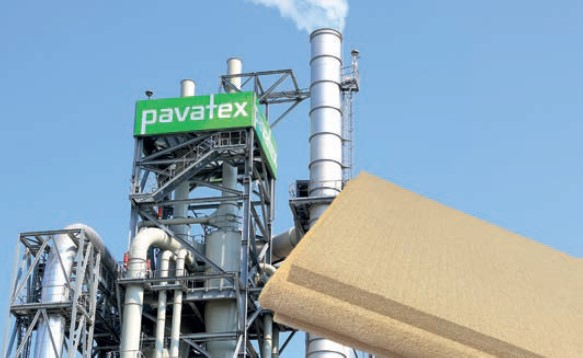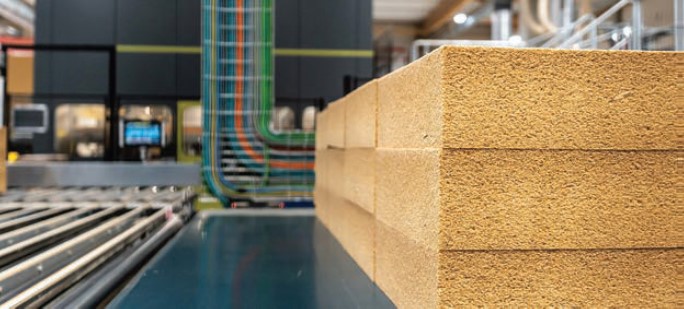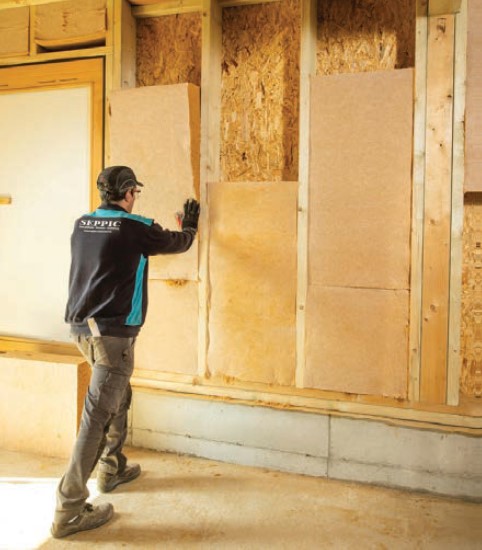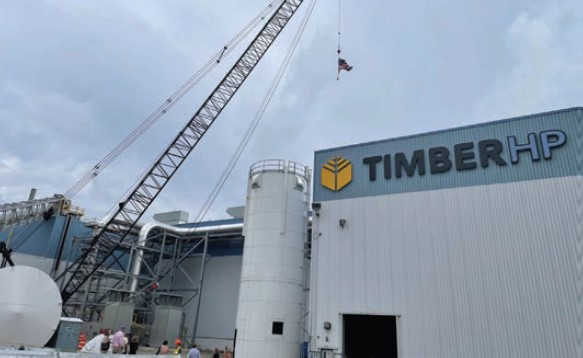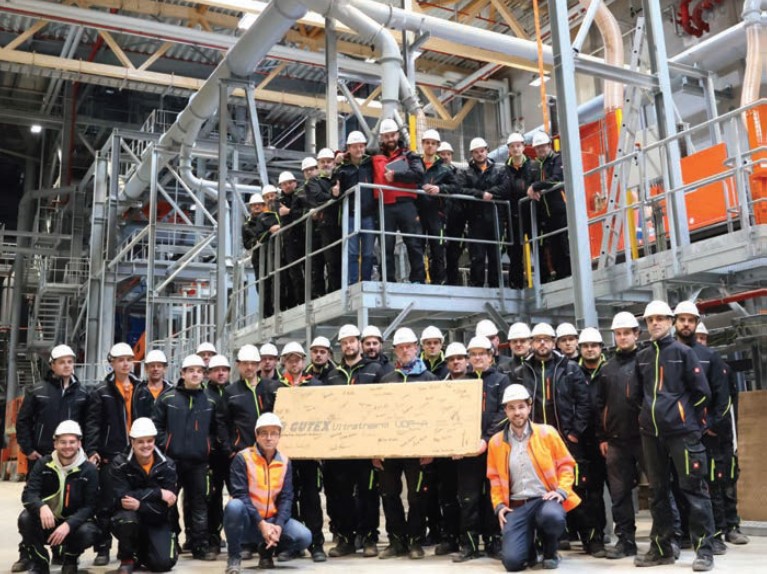Insulation – the natural way
26 March 2024The building industry slowdown has impacted the woodfibre insulation board sector, a star performer in recent years due to its high eco and performance credentials. Stephen Powney assesses the market
The building industry slowdown over the past year has impacted most wood product categories in Europe, even the recent star performer – woodfibre insulation.
This product, which is made in much the same way as standard wood-based panels, has seen high levels of growth in demand and production capacity in the past few years.
Its potential for increased future market share in the insulation sector looks good, particularly due to the emphasis on sustainable products.
But in the short-term, the market dynamics have been on a downward curve in terms of sales and demand, at a time when increased capacity has come online – particularly in Europe.
The European Panel Federation’s (EPF) most recent statistics show softboard (predominantly woodfibre insulation board) production output fell 8.9% to 5.1 million m3 in 2022 (2021: 5.6 million m3).
Rigid softboard accounted for 60% of the output and the flexible product for the remaining portion.
The EPF’s new figures will be released at its AGM in June and it’s unlikely that growth will have been seen for 2023 due to market situation and quite possibly a further decline.
EPF puts rigid softboard capacity at 3.55 million m3 for 2022, with flexible softboard at 3.32 million m3.
Poland remains the larger European producer of woodfibre insulation products, with France, Germany and Norway being other significant producing nations.
The largest applications are rigid products for the building shell, followed by flexible products for the same application and then rigid boards as underlays.
Eurostat data shows extra-EU exports of products totalled 332,000m3 in 2022, down by 27% on 2021. Switzerland was the largest destination, with a 34% share, followed by the UK at 19% and the US (8%).
Manufacturer financial results give an additional steer on the state of play.
European woodfibre insulation giant Steico, which has production plants in Poland and France, has released its preliminary business figures for 2023.
Sales declined by 17.9% to €365.3m (e), compared to €445.2m (e) in 2022. EBITDA was €59.6m (2022: €90m), a decrease of 33.8%.
Steico expects “stable development” for 2024 and said 2023 was characterised by a decline in construction activity across Europe, with the build sector continuing to find itself in a challenging economic environment.
However, it is not all gloom, as demand for Steico products stabilised at the end of 2023 and continued to do so at the start of 2024.
“The management sees the reasons for this in the continuing timber construction trend, the increased ecological focus and the gradual revitalisation of refurbishment activity,” it said.
“In addition, excess inventories at dealers and processors have now been reduced to normal levels.”
The company management expects demand to continue to stabilise for the remainder of 2024, provided the economic environment does not change. Its revenue is expected to remain at the previous year’s level.
In a nutshell, Steico believes the long-term growth trend of woodfibre insulation and associated timber building products will restart when the construction sector picks up again.
The other important news for Steico last year was the acquisition of 51% of the company by the Irish Kingspan Group plc and Kingspan Holding GmbH SE.
The Steico majority shareholder Schramek GmbH will still hold a further 10.1% of the shares in Steico SE.
Steico management expects the co- operation with Kingspan to generate sustainable synergy effects in market development as well as significant impulses for further growth.
CAPACITY EXPANSION
Moving to capacity news for the woodfibre insulation industry, there has certainly been movement in the past 12 months.
Leading German woodfibre insulation board manufacturer Gutex started production at its new Eschbach im Breisgau factory late in 2023 following a two-and-ahalf- year project.
Dieffenbacher was the main technology supplier on the project.
The project was focused on a CO2- neutral philosophy, featuring energy from photovoltaics and biomass, as well as district heating from the immediate neighbourhood.
The €100m project at the Breisgau industrial park is Gutex’s second plant. It is located a short distance to the company headquarters in Waldshut-Tiengen and to the company’s key core markets, which include Germany, France and Switzerland.
It also is near to the wood resources that Gutex sources from the Black Forest, Switzerland and, in the future, also from the Vosges.
The factory started test production in October/November 2023, with 70 employees working three shifts, before ramping up output at the start of 2024.
The dry process plant is to be operated in three shifts all year round and the drying plant has a production capacity of up to 4,800m3 per day.
The raw density of the woodfibre insulation boards is between approximately 100kg/m3 and 190kg/m3, depending on the area of application.
Gutex believes the use of green electricity, biomass, district heating and steam recycling, sets new environmental standards in the industry.
In the UK, waste MDF recycling innovator MDF Recovery (MDFR) struck a deal with UK MDF moulding manufacturer W Howard for the first licence sale in the UK for loose recycled MDF fibre insulation production.
Work on a new facility in Newtown, Powys, in Wales, has started and first production is expected in 2024.
W Howard’s multi-year licence allows it to use MDF Recovery’s MDF recycling technology to produce loose-fill woodfibre insulation in the UK and Irish markets.
Jonathan Grant, group chief executive of W Howard, said demand for natural building materials “is only going to increase” and the addition of a recycled woodfibre insulation was an exciting addition to its product portfolio.
W Howard will now also be able to recover its waste products as well as offering its customers a closed loop supply chain so they can return end-of-life products for conversion back into woodfibre for insulation.
In France, Isonat is investing €10m to expand the Mably woodfibre insulation panel plant, according to French news sources. The initiative is designed to double the factory capacity to 42,000t/yr, as the company seeks a big sales boom.
Saint-Gobain, the parent company of Isonat, said the investment dovetails with the French government’s energy renovation strategy for buildings.
Earlier tranches of investments were at Mably (France), with the plant’s annual capacity ultimately increasing from the 19,000 metric tons of insulation panels reported in 2021.
The aim is for the plant to insulate more than 16,000 homes each year.
Meanwhile, in Finland, Finnish materials technology company Fiberwood, is continuing with its plans to establish a woodfibre insulation product plant.
In 2023 it established a site in Kerava to build a pilot line, with the intention of establishing commercial projects in 2024.
The company was established in 2019 based on customer projects commissioned by VTT, one of Europe’s leading research institutions.
Fiberwood has developed the technology and production process to turn forest raw material by-products from Metsä Group into high-value fully bio-based insulation boards and packaging materials.
Metsä Group has invested in the company in the latest funding round, with additional monies coming from government financing from Business Finland.
Since September 2022, Fiberwood has been able to produce commercial-sized insulation boards for testing. It is now onto the project to build a continuous pilot line for production-scale product and process development.
Tage Johansson, Fiberwood CEO, penned a blog on the Fiberwood website earlier this year, stating that the company had established important customer relationships and launched product development projects “that will define our future”.
Mr Johansson said the company had succeeded in solving the product development and production parameters but had encountered problems with material composition.
“Several of our woodfibre-based insulation materials now meet basic market requirements, although there is still some way to go,” he said.
The continuous pilot line is hoped to be running over the next year in order to supply customers with commercially viable product pilot batches.
“We expect finished products to flow into the commercial market in 18 months to two years.”
Returning to Steico, the Group announced in its H2, 2023 financial update that its investment project at Gromadka, Poland had progressed well.
Production of the first insulation boards was expected to have started in the third quarter of 2023.
In all, the new Gromadka operation comprises three large production plants: two for flexible wood fibre insulation mats with a production capacity of over 1 million m3/year and one for rigid woodfibre insulation boards with a 500,000 million m3/year capacity from the dry process. The possibility of a further expansion of this plant to double its production capacity has already been taken into account in the plans.
Earlier completed Steico investments include the new production plant using the dry process at Casteljaloux, with a capacity of 250,000m3, plus a 135,000m3 capacity wet process production plant at Czarna Woda.
In Switzerland, Schilliger Holz AG is re-establishing woodfibre insulation board production in the country, with its development project near Lucerne.
Boards will be made under the “Lignatherm” product label, with a total of around 50,000 tonnes of wood chips being processed annually into woodfibre insulation boards.
The project held a ground-breaking ceremony in February 2024 to mark the official start of plant construction at Küssnacht am Rigi. Commissioning is scheduled for the second half of 2025.
It has been held up by a change of location. After an in-depth examination, the first location on the premises of the Pfunds LU paper factory, was judged to be too small.
After a renewed site evaluation, the Atinova AG industrial site in the Küssnacht Fänn industrial area proved to be particularly suitable. In particular, the proximity to the existing production site in nearby Haltikon LU resulted in synergies.
“This will add an important element to the wide range of Schilliger wood products and the comprehensive customer service,” the company said.
The production plant for woodfibre insulation boards will be completed by a wood-fired power plant.
Soprema, manufacturer of the Pavatex brand, is currently constructing a new plant in Chavelot, France. The additional ‘Pavatex 3’ woodfibre insulation plant involves Siempelkamp technology, with assembly due to have started in the final quarter of 2023. Its design capacity is approximately 55,000t of boards per year, which effectively doubles Pavatex woodfibre insulation board capacity to 110,000t per year.
In February 2024, international technology group Andritz said it had delivered a second fibre production line to Pavatex at the Golbey plant.
The line, which includes a chip handling and pressurised refining system, has now successfully produced first fibres at Golbey. The latest expansion significantly enhances the mill’s overall capacity and efficiency. The new line’s capacity is seven tons per hour.
Major wood-based panels manufacturer Sonae Arauco is establishing a new production line for woodfibre insulation materials at Meppen, which from 2025 will expand the portfolio to include flexible insulation, pressure-resistant woodfibre insulation boards, and blow-in insulation.
The project, an expansion of the company Agepan system, represents a €100m investment, strengthening Agepan’s role in the growth of Sonae Arauco’s portfolio for construction.
Although completed, it is also worth mentioning the huge investment by Ziegler Group in its Naturheld woodfibre insulation subsidiary.
A rigid woodfibre insulation board line in 2022 was followed up by a flexible product line, the former having a 500,000m3 capacity and the latter having a 1.5 million m3/yr capacity.
Across the two lines a host of main technology suppliers were involved including Dieffenbacher, Grenzebach, Andritz, Homag, Anthon and Urbas.
NORTH AMERICA
Woodfibre insulation boards are not exactly a product mainstay across the Atlantic in North America, but attempts are being made to boost their use.
Timber HP in Madison, Maine is the first US manufacturer of the product.
It opened in July 2023 on the site of a former paper mill that had been shuttered in 2016.
Timber HP initially started production of a loose fill insulation product and recently began shipping TimberBatt, a denser insulation.
The third and final product, an insulation board, will begin production in the coming months.
To support its efforts, the company has been awarded US$1m in loans from the Finance Authority of Maine and the Maine Rural Development Authority.
Matt O’Malia, TimberHP’s co-CEO, has admitted that developers have been a little wary of using an insulation material that is practically untested in the US.
“It’s historically been viewed as a premium sustainability product,” he said.
But the popularity of the material in European construction and the size of the market there – estimated at US$1bn – showed the potential of the material.
A multi-income residential development in downtown Westbrook will be the first residential project in the nation to use TimberHP woodfibre insulation.
The first phase of the Westbrook project, the Seavey Terraces apartment complex, broke ground in October and will provide 65 units to serve as workforce housing at belowmarket rates. In all, the development will eventually add 168 new housing options to the area, with a mix of affordable, workforce and market-rate homes.
Elsewhere in North America, Saint- Gobain completed its acquisition of Building Products of Canada at the start of September 2023 for an undisclosed sum.
The privately-owned company manufactures residential roofing shingles and woodfibre insulation panels. It has 460 employees and three manufacturing plants, at Montreal in Quebec, Edmonton in Alberta and Pont-Rouge in Quebec.
Saint-Gobain says that the purchase is intended to establish its position worldwide in light and sustainable construction.
